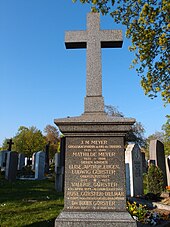Eugen Gürster
Eugen Gürster (born June 23, 1895 in Fürth ; † May 1, 1980 in Munich ) was a German dramaturge , literary scholar , writer and diplomat .
Life
The grandson of the Bavarian politician Joseph Gürster and son of Lieutenant Colonel Ludwig Gürster (1853–1933) and his wife Valérie Meyer (1873–1963) attended the Wilhelmsgymnasium in Munich. After graduating from high school in 1914, he began studying, but was then initially a soldier in the First World War from 1915 to 1918 . From 1920 to 1923 he studied philology, archeology and musicology in Munich and received his doctorate on " Ferdinand Raimund and the theater". As a student he was a member of the "Community of Socialist Students". After completing his studies, he worked as a writer and found employment as a dramaturge in Breslau in 1924 and chief dramaturge in Darmstadt in 1932 .
After the handover of power to the National Socialists , he had to emigrate to Switzerland . There he wrote 350 essays and essays under the pseudonym Hermann Steinhausen for the Basler Nationalzeitung , the Berner Bund , for Thomas Mann's magazine Mass und Welt and for Radio Beromünster . In 1938 he married the opera singer Rose Delmar (1900–1968), they had a son René Ludwig (* 1938). On April 29, 1941, he was expatriated from the German Reich and on August 4, 1941, it was announced in the Reichsanzeiger that the University of Munich had revoked his doctorate. In 1941 he emigrated to the USA, where he worked for the newspaper Aufbau in New York City . He had guest lectureships at American colleges and Rose Delmar sang with Set Svanholm at the Philadelphia Opera in 1947 . When he returned to Germany in 1952, he was accepted into the Foreign Service and worked as a cultural attachée in London until 1959 and in Vienna until 1962 .
Gürster was a member of the PEN and the German Academy for Language and Poetry . He was awarded the Federal Cross of Merit 1st Class and the Bavarian Order of Merit.
Fonts (selection)
- Ferdinand Raimund and the theater. 1920 Diss.
- Calderon de la Barca. Selected plays. Life is a Dream. The miraculous magician. The steadfast prince. The judge of Zalamea. New seals. CH Becksche Verlagbuchhandlung, Munich 1928.
- Weather changeable! Comedy in 3 acts, Drei Masken Verlag, Berlin 1932.
- The future of freedom. Europa-Verlag, Zurich 1938.
- People in the dark. Vita-Nova-Verlag, Lucerne 1946.
- The power of stupidity. Herder, Freiburg (im Breisgau), Basel, Vienna 1974.
- Under the pseudonym "Herrmann Steinhausen"
- The future of freedom. In: Thomas Mann , Konrad Falke (Ed.): Measure and value. Bimonthly publication for free German culture. Vol. 1, issue 1 from September / October 1937, pp. 63–74.
- The role of evil in world history. Bermann-Fischer, Stockholm 1939.
- The Jewish question - a Christian question. Vita Nova publishing house, Lucerne 1939.
- bibliography
- John M. Spalek (Ed.), German-language exile literature since 1933. Volume 4, Bibliographies: Writers, publicists and literary scholars in the USA. Part 1 (A – G), Francke, Bern 1994, ISBN 3-907820-47-9 .
literature
- Eugene Guerster. In: John M. Spalek (Ed.): German-language exile literature since 1933. Bibliographies. Part 1, Saur, Munich 1994, ISBN 3-907820-47-9 , pp. 618-625.
- Stefanie Harrecker: Degraded doctors: the revocation of the doctorate at the Ludwig Maximilians University in Munich during the time of National Socialism. Utz, Munich 2007, ISBN 978-3-8316-0691-7 .
- Hannes Heer , Sven Fritz, Heike Brummer, Jutta Zwilling: Silent voices: the expulsion of the "Jews" and "politically intolerable" from the Hessian theaters 1933 to 1945. Metropol, Berlin 2011, ISBN 978-3-86331-013-4 , P. 231.
- Werner Röder, Herbert A. Strauss (Hrsg.): Biographisches Handbuch der Deutschensprachigen Emigration nach 1933 / International Biographical Dictionary of Central European Emigrés 1933-1945. Volume II, Saur, Munich 1983, ISBN 3-598-10089-2 , part 1, p. 433.
Web links
- Literature by and about Eugen Gürster in the catalog of the German National Library
- Works by and about Eugen Gürster in the German Digital Library
- Eugen Gürster in the original sound in the online archive "Österreich am Wort" of the Austrian media library (Salzburg night studio)
- Eugen Gürster's estate in the German Exile Archive of the German National Library
Individual evidence
- ↑ at Ender "he voluntarily gave up his office in Darmstadt". See Wolfram Ender: Conservative and right-wing liberal interpreters of National Socialism 1930 - 1945, a historical-political criticism. Lang, Frankfurt 1984. Freiburg (Breisgau), Univ., Diss., 1981, p. 193.
- ↑ Peter de Mendelssohn : A militant traditionalist. In: German Academy for Language and Poetry : Yearbook 1980, 1. Schneider, Heidelberg 1980, p. 111.
| personal data | |
|---|---|
| SURNAME | Gürster, Eugene |
| BRIEF DESCRIPTION | German dramaturge and diplomat |
| DATE OF BIRTH | June 23, 1895 |
| PLACE OF BIRTH | Fuerth |
| DATE OF DEATH | May 1, 1980 |
| Place of death | Munich |
